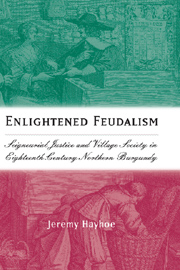 Enlightened Feudalism
Enlightened Feudalism Book contents
- Frontmatter
- Contents
- List of Illustrations
- Preface
- Introduction
- Part 1 Seigneurial Justice in Practice
- Chapter 1 Tiny Courts, Incompetent Judges?
- Chapter 2 Justice in the Interests of Lords
- Chapter 3 Justice in the Interests of the Community
- Chapter 4 Conflict and Consensus In and Out of Court
- Part 2 The Winds of Change
- Conclusion: Lords, Judges, and the Self-Regulating Village
- Appendix A Police Regulations from the Assizes during the 1780s
- Appendix B Class Justice? Statistical Tests
- Notes
- Bibliography
- Index
Chapter 1 - Tiny Courts, Incompetent Judges?
from Part 1 - Seigneurial Justice in Practice
Published online by Cambridge University Press: 12 September 2012
- Frontmatter
- Contents
- List of Illustrations
- Preface
- Introduction
- Part 1 Seigneurial Justice in Practice
- Chapter 1 Tiny Courts, Incompetent Judges?
- Chapter 2 Justice in the Interests of Lords
- Chapter 3 Justice in the Interests of the Community
- Chapter 4 Conflict and Consensus In and Out of Court
- Part 2 The Winds of Change
- Conclusion: Lords, Judges, and the Self-Regulating Village
- Appendix A Police Regulations from the Assizes during the 1780s
- Appendix B Class Justice? Statistical Tests
- Notes
- Bibliography
- Index
Summary
The village of Jullenay straddled the border between the territories of the Paris and Dijon Parlements. The only high-justice lord of the village, Etienne Philibert Debadier, had one set of officers to judge the village, but these officers theoretically sat over two different courts, depending on the residence of the litigants. In 1741 the lord complained that each time he began a court case against villagers, they “took no time to propose a change of venue [déclinatoire], and to maintain that they were from the jurisdiction of the other court.” Debadier himself had been the victim of such action in the 1730s, in a case that went all the way to the Royal Council. This expensive case made him decide to have the village surveyed and the borders of the two provinces and justices clearly established.
Geographic jurisdiction was complicated in Jullenay. Many cases led to requests for a change of venue, suggesting not only the lack of rationality in the administration of justice but also the exasperation ordinary people may have felt with the judicial system. This village, then, seems illustrative of many of the criticisms historians have directed against seigneurial justice in the ancien régime. They have complained that geographic jurisdiction was too divided, too irrational, and too arbitrary. André Giffard estimated that in Brittany in the early eighteenth century there was an average of two seigneurial courts per parish and sometimes as many as thirty courts within one parish.
- Type
- Chapter
- Information
- Enlightened FeudalismSeigneurial Justice and Village Society in Eighteenth-Century Northern Burgundy, pp. 21 - 44Publisher: Boydell & BrewerPrint publication year: 2008


